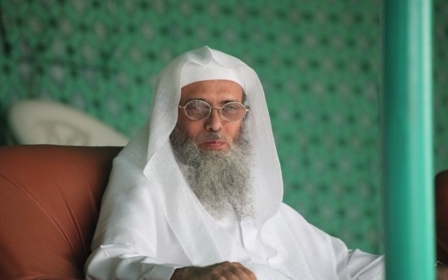Arabic press review: Detained Saudi dissidents go on hunger strike

Saudi rights activists launch hunger strike in jail
Detained Saudi human rights activists reportedly staged a hunger strike in Riyadh’s Al-Ha'ir Prison on 6 March.
Maha al-Qahtani, wife of Mohammed al-Qahtani, one of the founders of the opposition Hasm movement, said her husband and about 30 other people had started a hunger strike, including human rights defenders Fawzan al-Harbi and Aissa al-Nukhaifi.
Mohammed al-Qahtani, 55, is a Saudi economics professor, political activist, and one of the founding members of the Saudi Civil and Political Rights Association (ACPRA).
Qahtani was arrested in March 2013 and sentenced to 15 years in prison.
New MEE newsletter: Jerusalem Dispatch
Sign up to get the latest insights and analysis on Israel-Palestine, alongside Turkey Unpacked and other MEE newsletters
This is not the first time Qahtani has been on a hunger strike. He had previously gone on hunger strike in protest against being placed with convicted criminals.
Supporters of Qahtani launched a social media campaign under the hashtag “Hasm Strike” to show solidarity with the prisoners and call for their release.
Egypt raises drug prices, citing shortages
Egyptian pharmaceutical distributors have re-priced 19 drugs, which led to an official price increase of 60 percent, according to information published by Al-Araby Al-Jadeed newspaper.
The pharmaceutical companies obtained approval from the Ministry of Health and Population for the price increase, which included both locally manufactured medicines and other imported drugs.
The sharp increase came after weeks of price increases for many types of medicines for liver and heart disease, blood pressure, diabetes and allergies.
The Egyptian health ministry had recently approved a price increase for more than 3,000 medicines, with a 50 percent increase for medicines under 50 Egyptian pounds, a 40 percent increase for medicines over 50 Egyptian pounds and a 30 percent increase for medicines over 100 Egyptian pounds, under the pretext of facing a shortage problem, and the lack of many essential and basic medicines from the local market.
UN demands release of six Bahraini activists
The Americans for Democracy and Human Rights in Bahrain (ADHRB) called for the release of six Bahraini activists detained in their country, Al-Quds Al-Arabi newspaper reported.
The United Nations Working Group on Arbitrary Detention confirmed last November that six Bahraini activists were arbitrarily arrested and confessed under torture, in addition to many violations committed against them by the Bahraini authorities.
The UN body recognised that those activists were arrested without a judicial warrant, and that the officials used torture against them to extract confessions, in flagrant violation of international law.
The Working Group called on the government of Bahrain to take the necessary steps to correct the situation without delay in accordance with international standards, including the "immediate and unconditional release" of the prisoners and grant them financial compensation.
The UN body added, in its memorandum, that all of the defendants were denied access to their lawyers, and were allowed limited visits at certain times, indicating that all six individuals were subjected to torture and ill-treatment, which resulted in extracting confessions using violence in at least four cases.
The UN team urged the Bahraini government to ensure that a comprehensive and independent investigation is conducted into the circumstances surrounding the arbitrary deprivation of liberty practised against the six activists, with the aim of holding the perpetrators accountable.
Potential pardon for detainees in Kuwait
Kuwait is taking “quiet and accelerated steps” to grant amnesty for a number of convicts in certain cases, while attempting to finalise and elaborate this file over the next few days, the Kuwaiti newspaper Al Rai reported.
According to the newspaper, "the completion of the special pardon file would ease one of the most important causes of escalation and corrosion between the legislative and executive branches".
Informed Kuwaiti sources told the paper that the Deputy Prime Minister and Minister of Justice Abdullah al-Roumi "took over the entire file", representing the government.
The sources indicated that there has been an agreement that the former MP Musallam al-Barrak, who is currently based in Turkey, will be a representative for negotiations and discussions of the upcoming amnesty.
The sources pointed out that the pardon process has already been initiated, stressing that granting amnesty is the exclusive right of the emir of the country, which means that the final decision will be his regarding any agreement to be reached in the coming period.
Kuwaiti media reported in January that 600 prisoners were set to be released in the following months. According to the reports, those to be pardoned are not involved in state security or money laundering cases.
*Arabic press review is a digest of reports that are not independently verified as accurate by Middle East Eye
Middle East Eye delivers independent and unrivalled coverage and analysis of the Middle East, North Africa and beyond. To learn more about republishing this content and the associated fees, please fill out this form. More about MEE can be found here.




